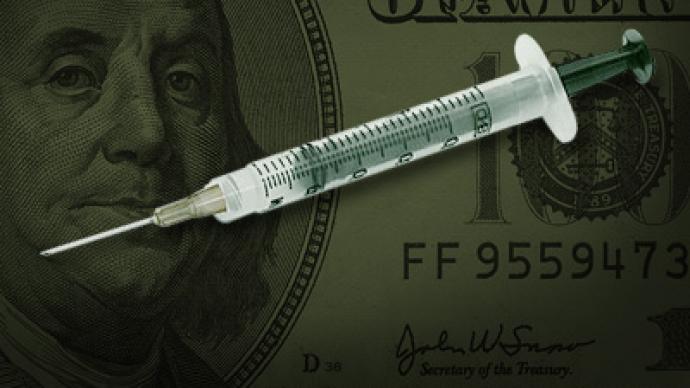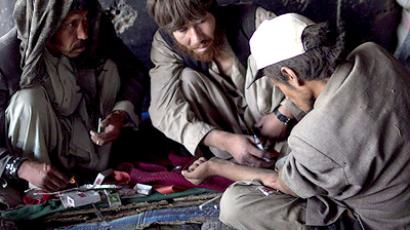“Hundreds of billions in drug money pumped into banks during crisis”

The head of Russia's Federal Drug Control Service Viktor Ivanov told RT how the problem is being tackled in the country and worldwide, and how those profiting from the addiction resist this effort.
RT: According to official statistics, more than 7,000 people have died in Russia from drug-related deaths since the beginning of this year. At the same time, others are saying that this number is actually more than 100,000 people. How come there is such a huge difference in numbers? Viktor Ivanov: You see, the figure of 7,000 dead reflects only the number of people who actually died from drug poisoning. That is, they took such huge doses that their organisms failed. A total majority of drug abusers, however, die not from overdosing; they do know how to measure their doses. The reason for most drug-related deaths is internal organ failure due to regular consumption.RT: Unfortunately, Russia is now the world's third most heroin-consuming country after Afghanistan and Iraq. Some people, such as Mr. Gryzlov, propose life sentences for drug abusers, while others propose the death penalty. What is your position? VI: We have proposed a bill on differentiating responsibility, and it has been upheld by the government. According to it, individuals selling large shipments of drugs will be in for more severe punishment, all the way up to a life sentence. For people not involved in gross drug-related crimes, we are considering alternative responsibility, which means offering them an option of taking a therapy course instead of punishment.RT: There is information that of all the heroin coming into Russia, only 10% is intercepted and confiscated. Why is border control so ineffective and can this be fixed? VI: These figures are, in fact, common for the whole world. I mean, police all over the world, be it Europeans or Americans, only manage to confiscate around 10% of drugs illegally traded within their countries. Another thing is that the extremely low efficiency of our borders and their administrative and legal mode of operation lead to the fact that only 0.2% of all drugs are intercepted at the borders. Drugs that get to Russia first have to go through the states of Central Asia, and they are not intercepted here. Those states are themselves, above all, victims of Afghanistan's enormous drug production. As a matter of fact, Afghanistan itself is largely the victim of the global drug mafia, which forms the demand and the political will to continue production in this country. This is why countries adjacent to Afghanistan have the greatest density of drug flow: simply because they are closer to the epicenter.Further away, the drug flow ramifies into lots of different channels and then drugs get to Russia, for example, through the 7,000-kilometer border with Kazakhstan. RT: What synthetic drugs are brought in from Europe? VI: Over 80% of all synthetic substances illegally traded in Russia originate in Europe. Mostly it's the Netherlands, where most amphetamine-based drugs are manufactured, Poland, Baltic States, Germany, Bulgaria, and many other countries with undercover drug labs.The labs themselves are small, but there are many of them, and the substances they produce find their way to Russia via various channels. Speaking of the amounts that we intercept and confiscate, it's nearly half a ton of synthetic substances a year. Mostly those are methamphetamine, amphetamine, LSD, ecstasy, and other drugs.RT: You have been speaking in favor of testing schoolchildren for drugs. Do you think that parents should be tested for drugs as well, because some say that second or third-grade kids first get exposed to drugs through their parents?VI: Well, you know, testing people en masse would be way too radical. No, of course not. We are talking about establishing an early warning system to detect drug addicts and drug abusers. After all, people are not born addicted to drugs. It all starts with experimenting, mostly at teenage age, when kids start spending more and more time on the streets, away from their parents. That's when they get to know drugs.If this is detected at an early stage and if parents are warned in advance, sometimes it takes just parental attention and parental advice to put an end to those dangerous experiments. If not stopped in time, those experiments later lead to regular consumption, which in turn requires longer and costlier treatment.RT: Do you find forced treatment admissible?VI: No. We are not talking about forced treatment here. Any forced treatment is a violation of a person. Therefore it’s important that drug abusers make this decision themselves. In our country, drug abuse is subject to administrative liability and punishment of paying a fine, on average 600 rubles [$21]. They’re punished, and then they’re released.Therefore, our society seems to hope that drug abusers will somehow realize that they require treatment for this addiction. However they will not realize this, as their mind is blurred by chemical injections of psychoactive substances. Therefore, a legal system should be created to push them toward having to undergo treatment.As I’ve said, this is the so-called alternative responsibility. By the way, this is also recommended in the UN anti-drugs fundamental conventions.RT: The Global Commission on Drug Policy called the war on drugs a failure. Do you agree?VI: This Global Commission has nothing to do with the UN. Perhaps a lot of media was tempted, or provoked by the presence of the former UN Secretary-General Kofi Annan in this commission. I have to say that we denied this kind of conclusion, and so did my colleagues in the US-Russia Presidential Commission. Mr. Gil Kerlikowske made a harsh statement; we discussed it immediately with Washington over the hotline, and criticized this global commission. Legalizing drugs is a road to nowhere. Moreover, it will result in a boost of drug abuse. Let me remind you of a referendum on legalizing marijuana in California in September last year. I was there in the midst of this LA referendum where we decided with Mr. Gil Kerlikowske at a number of meetings with officials, including the mayor, the sheriff, the chief of police, the prosecutor. All these respectable professionals had a clear standing against legalizing marijuana. And the referendum confirmed that it should not be legalized. RT: In your opinion, why would you say some people would find it profitable to lobby for drugs? For example you’ve said that George Soros has essentially sponsored a drug campaign in California.VI: I have explicit information from the US Presidential Administration that this financier had largely funded this campaign.RT: Is there such thing as drug lobbying? Who would be a point for such a lobby to exist?VI: Yes, certainly this example of the Global Commission reminds me of a global PR campaign by drawing so much attention that even such a respectable agency like the BBC covered the fact that this commission belongs to the UN. I mean, even such serious agencies were led to confusion. Therefore there are all reasons to believe that this drug lobbying had funded this kind of speech.Moreover, I wanted to indicate what we’ve been discussing at various international platforms. On May 10, I spoke at the G8’s Ministerial conference in Paris, and so did many of my colleagues. We said that unfortunately our fight against drugs stagnates at both local and regional levels, whereas the global level stays even beyond our understanding. This concept hasn’t been developed yet.In this context, I want to note that the former Under-Secretary-General of the UN Antonio Costa who was responsible for the drug problem mentioned that in 2008-2009, in the midst of the global financial crisis, US$352 billion from selling drugs was pumped into the world’s leading banks. This means that a certain global level determines or sets the demand for drugs turnover, and ultimately, a political order for this production.RT: Do you think that the situation related to trade in drugs, including those produced in Afghanistan, will change after US and NATO troops pull out from Afghanistan? VI: As far as the withdrawal from Afghanistan is concerned, the picture is unclear so far. It was said that the withdrawal would start and certain parameters for it had been set. They’ve mentioned 30,000 troops at the end of the year.But when I was in Washington last September they were talking about the need to increase the military contingent in Afghanistan exactly by 30,000. Now, they are planning to return these 30,000. So, in fact, nothing has changed. I think that the world community, and you will find it hard to disagree, is beginning to reconsider the situation in Afghanistan because there were several reasons behind the decision to launch a military operation and the decision of the world community to interfere in the internal affairs of this country: first, to put an end to the Taliban rule, to set up interim administration and hold free elections.Those tasks were supposed to be completed in six or 12 months at least. This September will see the tenth anniversary of that interference. It’s longer than World War II. But the situation in Afghanistan hasn’t improved, it has become even worse. And even senior officials like General Petraeus, for example, who commanded the military operation in Afghanistan, says that the number of armed clashes there increases year after year. In fact, the number of armed clashes over the past ten years has increased more than a hundred times.So have the assigned tasks been achieved? We see that security in Afghanistan has only got worse. It’s said that drugs production cannot be fought because it damages the security situation in the country. So, it’s a kind of closed circle.In this respect, it would be noteworthy to recall a NATO operation in Helmand province, which produces the greatest amount of opium poppy. The operation was called ‘mashtarak’ which, if translated from Persian, means ‘together’. The operation was presented as a brilliant military success. Considerable kilometers and hectares of that province were reportedly cleared from insurgents but the production of opium poppy has never stopped.That is why a peaceful settlement is necessary. We’ve started talking about this need at long last. It was highlighted at the London conference on Afghanistan in January 2010. The autumn conference in Kabul also stressed the need to find a peaceful settlement. The latest initiatives voiced by US President Barack Obama on negotiations with the Taliban and the latest resolutions of the United Nations Security Council which divided responsibility between the Taliban and Al-Qaeda are offering unique opportunity, in my view, to draw up a program of elimination of drugs production.I’ve just come from a meeting of the parliamentary faction of the Progressive Alliance of Socialists and Democrats, the second largest faction in the European Union. Here, outside the European Parliament building, we discussed the EU strategy towards Afghanistan. Large sections of that strategy are devoted to liquidation of drugs production in Afghanistan.The EU strategy matches very well a Russia-drafted plan called “Raduga-2” to liquidate the production of drugs in Afghanistan. In fact, the force vectors of Russia and the European Union are fitting each other very well. So, today we have a unique opportunity for resolute and decisive action. RT: Thank you very much for your interview.VI: Thank you very much.














